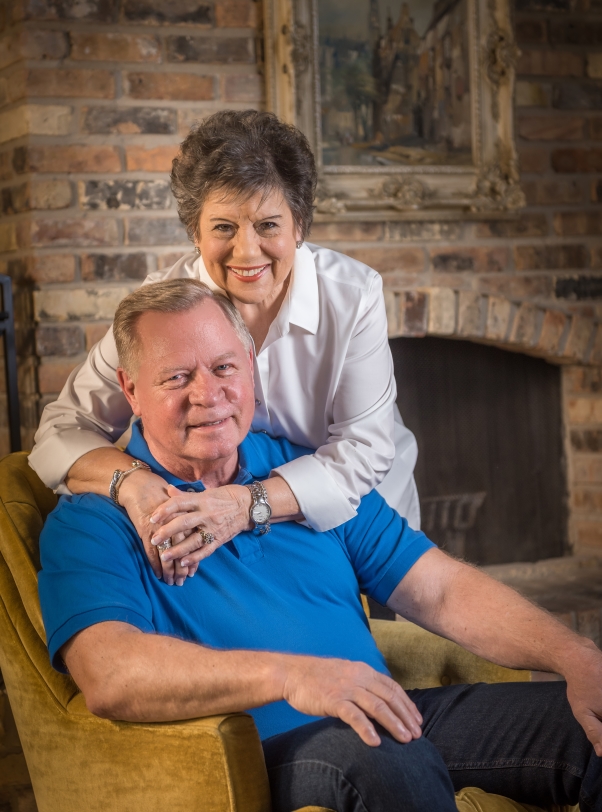Prostate Cancer Survivor Says Make That First Appointment
- Category: Community Newsletter, Patient Stories
- Posted On:
- Written By: Nanette White
 A former high school shot put champ, college football player, coach and Army lieutenant, Jimmy Barrilleaux had always been strong and healthy – until a routine visit to his primary care doctor showed his PSA levels were high.
A former high school shot put champ, college football player, coach and Army lieutenant, Jimmy Barrilleaux had always been strong and healthy – until a routine visit to his primary care doctor showed his PSA levels were high.
A PSA test, the most common screening tool for prostate cancer, measures a protein in the blood called prostate specific antigen. A high PSA level can be the first sign of prostate cancer.
Barrilleaux’s doctor, internist Charles Ducombs, discovered during an annual wellness visit that his PSA level was high and referred him to urologists at Northshore Urological Associates.
Drs. Stephen M. Graham and Brad M. Lake, along with Nurse Practitioner Kimberly L. Marcel, specialize in the diagnosis and treatment of male and female urinary tract disorders and the male reproductive system, including prostate cancer.
The prostate is a small walnut-shaped gland in men that produces the seminal fluid that nourishes and transports sperm. In its early stages, prostate cancer usually has no symptoms. When it’s more advanced, signs and symptoms may include trouble urinating, decreased force in the stream of urine, blood in semen, discomfort in the pelvic area, bone pain and erectile dysfunction.
About one man in nine will be diagnosed with prostate cancer in his lifetime, making it the most common cancer in men, other than skin cancer. This year, about 174,650 new cases will be diagnosed and more than 31,600 deaths will be due to prostate cancer. But caught early, most will not die from it. In fact, there are 2.9 million prostate cancer survivors in the United States today.
In general, screening is recommended for men beginning at age 50. Those with risk factors, like family history, obesity, age and race (African-Americans are at higher risk), are usually advised to begin testing earlier than this. Both Barrilleaux’s father and brother had prostate cancer.
After 12 biopsies displayed cancer, Dr. Graham discussed both surgery and radiation as accepted therapies for prostate cancer treatment. Barrilleaux and Bonnie, his wife of 44 years, agreed to attack the cancer with the same tenacity he exhibited as an athlete and soldier.
“I said, ‘Let’s get it done. I’m ready now,’” he notes.
His wife adds, “They told me how serious it could be. I knew he had a problem and we were going to face it and take care of it right away. And we prayed.”
The da Vinci robotic surgery was performed by Dr. Lake, who is trained in the da Vinci Surgical System, and he was assisted by Dr. Graham.
“Mr. Jimmy’s surgery was a little tougher than most due to the size of his prostate,” Dr. Lake explains. “But we took our time and were able to deliver him a great surgery with a speedy recovery.”
The Barrilleauxs were pleased with the results.
“One of Dr. Lake’s greatest assets is that he’s very personable and I think he really cares about his patients. You’re not just a number,” Mrs. Barrilleaux imparts. “North Oaks is so fortunate to have him, someone who does robotic surgery. We (the community) used to have to go to Baton Rouge or New Orleans for this type of treatment.”
Following two days in the hospital, a resilient Barrilleaux returned to his part-time job at Ross Downing Cadillac two weeks later. Today, he has beat cancer and has regular six-month check-ups with Dr. Lake. He spends much of his time with Bonnie and his four children, 12 grandchildren and four great-grandchildren.
Last year, Barrilleaux, 71, was recognized as honorary captain in the Southeastern Louisiana University and Louisiana State University football game in Baton Rouge, where he played offensive guard in the 1960s. The occasion was even more special with his family in attendance.
“Mr. Jimmy is doing fantastic and is cancer free. He is enjoying life knowing his cancer has been taken care of,” Dr. Lake observes. “He has no side effects from surgery and tells me every visit how pleased they have been through the entire process.”
Both Barrilleauxs agree that the support of family and friends was vital in helping him through the dark days. A cancer diagnosis also affects family members and friends so understanding the lifestyle changes and treatment is part of the healing process.
“She (Bonnie) was there with me, every step of the way,” he recalls, adding how she “swept me off my feet” when they met in Amite where they both were teaching.

“I was proud of him in how he responded,” she remarks. “Men don’t always do what they’re supposed to do. But, he did not hesitate when we were told the news.”
Because of the family history, the Barrilleauxs have encouraged their son to get regular check-ups. They agree that “staying on top of it” and awareness are the keys to early detection.
“I would agree that following the recommended screening protocols lead to early detection of prostate cancer,” he notes. “Early detection leads to early intervention and excellent survival rates with treatment.”
What advice would Barrilleaux give to others facing the same condition?
“Make that first appointment and make sure you get a guy like Dr. Lake. He’s ‘A No. 1,’” Barrilleaux recommends. “He pays attention to everything you say, and it’s a good thing to have a doctor who really cares about you.”
Is it time for a prostate exam? Visit www.northoaks.org/prostate to request an appointment with our board-certified urologists or to learn more.
Tell Us Your Story
At North Oaks Health System, we are inspired every day by stories of hope and healing from our patients and their families, as well as our health care team.
If you would like to share your success story with North Oaks, please click here.




[1].jpg)